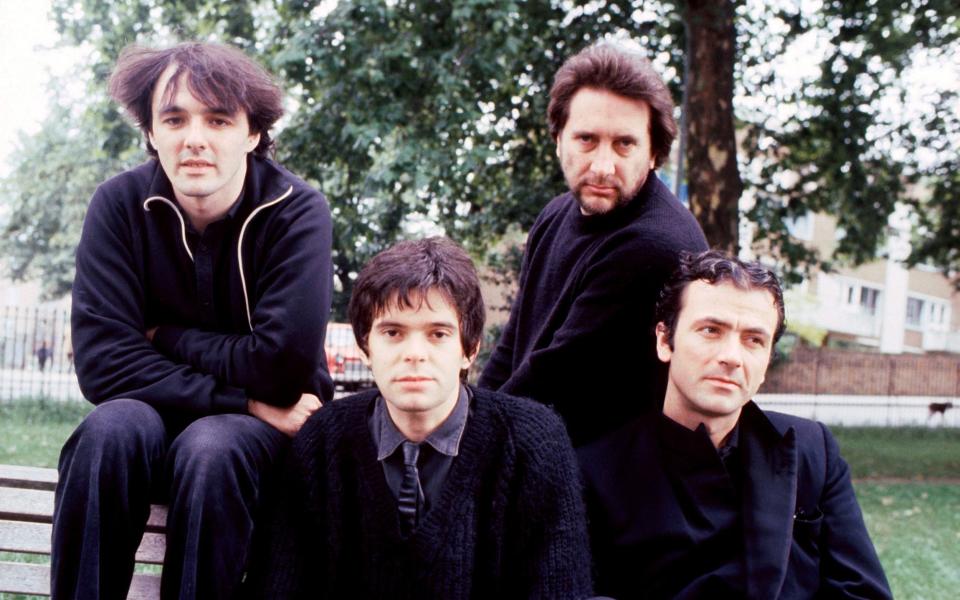Dave Greenfield, keyboard player with the Stranglers – obituary

Dave Greenfield, who has died aged 71 after contracting Covid-19 while being treated in hospital for a heart condition, was the keyboard player with the Stranglers, who rode the punk wave of the late 1970s while sounding nothing like any of their peers.
He was often likened to Ray Manzarek of the Doors – though he said his chief inspirations were Rick Wakeman of Yes and Jon Lord of Deep Purple – and along with the distorted, subterranean bass guitar of Jean-Jacques Burnel, his rippling arpeggios were the defining characteristic of the band’s sound.

Mild-mannered, charming and affable, certainly the most approachable of the Stranglers, David Paul Greenfield was born on March 29 1949 in Brighton. He started out on the guitar, having been taught by an older schoolfriend, and played rhythm guitar in a local band before taking up keyboards.
He played in prog bands that included Rusty Butler and Credo, before joining the Stranglers – formerly the Guildford Stranglers – in 1975 after answering an ad in Melody Maker.
With Jet Black on drums, Burnel on bass and Hugh Cornwell on guitar and snarling vocals, they worked the London pub circuit relentlessly, securing a Monday-night residency at the Nashville in West London, and in December 1976 they were signed by the United Artists label.
Their debut single (Get a) Grip (On Yourself), released the following month, was one of the first singles of the punk revolution, and just about made it into the top 50. But the Stranglers, older than most of their peers, were outliers on the scene, despised by rivals for their instrumental virtuosity and thoroughly detested by the critics for songs that were seen as misogynist and racist.
The latter charge, at least, was unjust, though there was a bad-mouthed misanthropy running through their lyrics (mostly written by Cornwell and Burnel). “Their thuggishness was compelling, their singles like a set of dirty postcards,” wrote Bob Stanley in his book Yeah Yeah Yeah.

On stage, Greenfield’s banked keyboards conjured images of the prog rock bands that punk was supposed to have swept away. Similarly unpunklike was the pentagram pendant he was often photographed wearing. It represented, he recalled, “the relation between the self and the universe. I studied – not practised – the occult quite intensively in those days.”
The Stranglers became the bestselling of all the punk bands, with seven UK Top 10 singles in the late 1970s and early 1980s including Peaches, Something Better Change and Strange Little Girl, and albums such as their debut, Rattus Norvegicus, and its follow-up No More Heroes.
As punk matured into what became known as New Wave they developed a more expansive sound, centred even more on Greenfield’s layered, intricate keyboards.
He was largely responsible for their best-loved song, Golden Brown (1982). His baroque harpsichord – mostly in 6/8 time – gorgeously underpinned Cornwell’s haunting paean to heroin (the singer had recently spent eight weeks in Pentonville for possessing the drug).
Despite its subject matter – and the band’s bad-boy reputation – it became a favourite on Radio 2, and was only kept off the top of the UK chart by the Jam’s A Town Called Malice. An Ivor Novello award followed.
The band’s success continued throughout the 1980s, and though Cornwell left at the end of the decade, Greenfield, Black and Burnel carried on touring and recording with an assortment of singers and guitarists. They had been finally been planning to call it a day this year with a farewell tour, which was postponed thanks to the pandemic that claimed Greenfield’s life.
Away from music, Greenfield was a medieval battle re-enactment enthusiast, and held a pilot’s licence for several years. He also owned a pub for a while, and at home he kept a collection of pet rats.
Dave Greenfield is survived by his wife Pam.
Dave Greenfield, born March 29 1949, died May 3 2020

 Yahoo News
Yahoo News 
